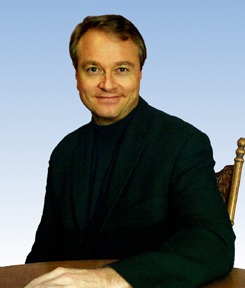Steve McIntosh was voted by the members and visitors of Universe Spirit as our Philosopher Artist for the Spring Quarter 2006
 Steve is an independent scholar who has been on a personal spiritual path since an early age. He is also a social activist working to bring about cultural progress through the application of the emerging integral philosophy of evolution. McIntosh's work in the integral philosophy movement has led to the forthcoming book: Integral Consciousness and the Future of Evolution. In addition to his research and writing, McIntosh has also recently founded the Project for Integral World Federation, a non-profit organization that hosts an on-line petition for global governance: www.integralworldgovernment.org .
Steve is an independent scholar who has been on a personal spiritual path since an early age. He is also a social activist working to bring about cultural progress through the application of the emerging integral philosophy of evolution. McIntosh's work in the integral philosophy movement has led to the forthcoming book: Integral Consciousness and the Future of Evolution. In addition to his research and writing, McIntosh has also recently founded the Project for Integral World Federation, a non-profit organization that hosts an on-line petition for global governance: www.integralworldgovernment.org .
McIntosh is an honors graduate of the University of Virginia Law School and the University of Southern California Business School. He has worked as a lawyer and a corporate executive, he’s been a national-class bicycle racer, and he’s traveled extensively throughout the world. Today, McIntosh is the president of Now & Zen, Inc., an international manufacturing company that markets a variety of "natural lifestyle products" which he has invented: www.now-zen.com . McIntosh is also a founding member of Ken Wilber’s Integral Institute, he’s worked as an integral consultant, and he has given lectures on integral philosophy in a variety of venues, including Naropa University. Born in Connecticut in 1960, McIntosh now lives with his family in Boulder, Colorado. He can be reached at: steve@now-zen.com
Recently, Integrative Spirituality's Director, Lawrence Wollersheim, talked to Colorado author and entrepreneur Steve McIntosh about the evolution of consciousness and culture as understood from the perspective of integral philosophy. A portion of their conversation follows:
LW: Do you think your consciousness has evolved?
SM: Well, I’m always suspicious of people who claim to have "higher consciousness," but, like most people, I do have a sense of how my values and worldview have developed and become more complex over the years. I can see this in the way my perspectives are now more inclusive of the views of others. However, while I’ve become more accepting, I’ve also become more discriminating—as my experience has accumulated, it’s gotten easier to recognize falsehoods and cultural pathologies.
LW: Do you think human culture has evolved?
SM: I think the answer is clearly yes, although not everyone in the world is living in "the same time in history," and examples of stagnations and regressions are abundant. The transition from the various kinds of traditional, ethnocentric worldviews to modernism's reason-based scientific worldview was a major step. Then in the 20th century modernism itself was transcended by a more worldcentric, postmodern worldview (now 25% of the U.S.) that is generally more sensitive and caring. And now we can begin to see the emergence of the next historically significant worldview beyond the postmodern. This new way of seeing things arises from a system of values, identified as the "integral worldview," that is bringing together the best (and carefully pruning away the worst) of premodern, modern, and postmodern cultural structures.
LW: What is higher consciousness?
SM: According to integral philosophy, there are temporary "higher states" (epiphanies, glimpses of the Divine) and then there are more permanent "higher stages" of consciousness. More evolved stages of consciousness are characterized by forms of morality that are concerned with the good of wider groups of people, forms of knowledge that encompass greater amounts of truth, and forms of art that express beauty with greater sublimity. This is obviously a complex subject and there are many dimensions of higher consciousness. For example, I think it is possible to achieve a degree of "self actualization" within almost any stage of cultural evolution. Also, because there are a variety of developmental lines within consciousness, it is possible for a person to be highly evolved cognitively while still being emotionally immature. Conversely, it is also possible for a person to have highly evolved morals and values, while remaining relatively undeveloped cognitively. Thus, I think it is actually possible to identify three primary lines of development: emotional intelligence (rooted in the body), cognitive intelligence (arising primarily from the neocortex), and values intelligence (which arises from a person’s worldview and the particular cultural structures of history with which they identify themselves).
LW: How do you measure or determine whether consciousness is "more evolved"?
SM: I think the best "test" was articulated by Jesus who taught —"By their fruits you shall know them." That is, I think higher consciousness is as higher consciousness does. It is our service to others (both big and small) that actually provides the "rungs of the ladder" of our personal ascent. Our own degree of development can thus be measured by our usefulness to our fellow creatures.
LW: How can a person evolve their consciousness?
SM: The evolution of consciousness is generally connected with the evolution of culture. So one way to experience the growth of our consciousness is to allow ourselves to be "transported" by the "cultural vehicles" of great books, great music and art, and by practicing the techniques of spiritual growth revealed by the many saints and sages who have brought us light throughout the ages.
These questions are explored further in McIntosh’s forthcoming book, entitled Integral Consciousness and the Future of Evolution.
Articles:
- Noosphere Evolution and Value Metabolism
- World Federation: A Transcendent Vision of Integral Consciousness
Please visit http://www.integralworldgovernment.org/ to view Steve's "Declaration of the Value of Global Governance" and www.now-zen.com for Unique and uplifting products from the company , Now and Zen.
